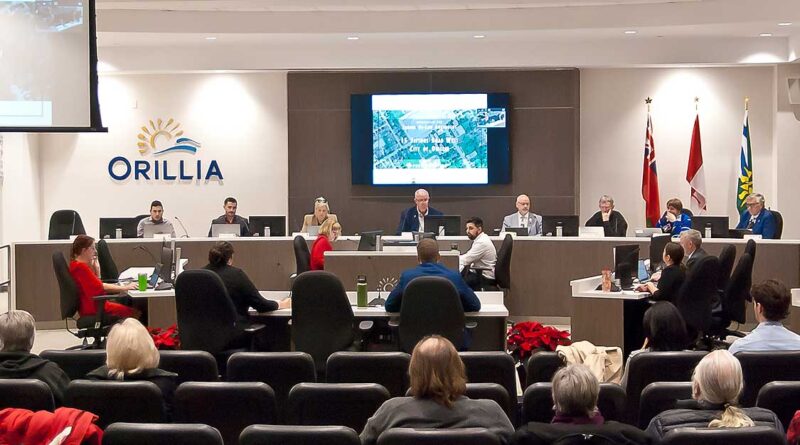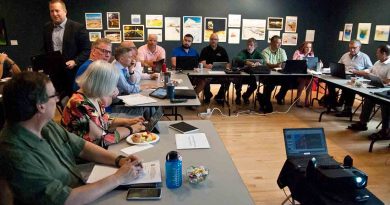Analysis: Council Preview
By John Swartz
A staff initiative to have council abolish several committees of council is back on Monday’s council meeting agenda. In December council postponed a decision because several councillors thought the changes were so sweeping the committees involved should be consulted before a decision is made.
There is an addendum this time around itemizing feedback from most committees, which appears to have been drafted by one hand with one perspective since many of the same phrases repeat though they are purported to have come from different committees.
Where to start. Staff’s proposal has so many problems picking on one issue, or two or three, does not mean the others are no less important, but a complete analysis of the report might run to book length.
First it might be helpful to ask why change is needed. Who wants this change and will the citizens of Orillia be served by the proposal? Council didn’t formally ask. Committee members of long standing have been dissatisfied with how staff and rules are choking their work. Since staff started to exert control about a dozen years ago, they have made more work for themselves and bureaucrats loath making more work for themselves –if only there were fewer committees.
Maybe the overview should include why the committees exist. There is no way every councillor can be expert, or well informed on every issue council deals with. It is better to get feedback from people in the community who do know something. Consultants don’t have to be hired for every question.
Think back to the wrangling over the West Street site for the recreation center. Nothing about that was simple to understand and if it weren’t for the environmental advisory committee evaluating the various presentations, studies and information given at deputations, we’d probably still not have a recreation center.
The people on EAC weren’t there by accident. Most of them had a deep interest in improving the environment we live in. They had some expertise in some aspects of the subject as a personal interest, some even worked in the field outside the structure of the City. They understood the terminology, the buzzwords, the way scientific language works as opposed to common meanings. They knew the significance of parts per million of this or that, the likelihood of adverse effect of some of the known pollutants on the property, and etc.
Sure council has a bureaucracy at its disposal, and we hope the people administering the various departments are qualified and expert in their fields, capable of advising council and recommending reasoned direction. However, one also has to understand one of the defining characteristics of any bureaucracy is self survival. If one listens to council meetings, and in particular the discussion from December 11, one can hear staff telling council what they want council to hear, instead of answering the questions asked.
Bureaucrats are desk jockeys for the most part (even more so for the consultants hired by the City) and very often their recommendations work on paper, but in action in the community fall short.
So while it might look good on paper to get rid of all the committees and restructure them into what staff call engagement teams, they must remember they are getting paid to do their jobs. Committee members are volunteers who signed up because of specific interest. Staff’s bosses can get away with saying what the workday or workload is, but do that with volunteers and you soon have no volunteers to control.
The new structure proposed is:
Community First Engagement Team, Replaces environment, sustainability and climate change, recreation, transportation, active transportation, transit and parking and also serve as a planning advisory committee.
Community Wellness Engagement Team, replaces affordable housing, food accessibility matters and takes on poverty reduction, warming centers and community gardens.
Stronger Community Engagement Team, replaces Truth and Reconciliation, equity, diversity and inclusivity, the accessibility advisory committee, and the Hall of Fame inductions, awarding the Order of Orillia, and selecting the Citizen of the Year.
Business Retention and Culture Engagement Team, replaces economic development committee, and includes areas of the business development office (tourism, the innovation collective, tourism related partnerships – Mariposa Folk Festival, Lightfoot Museum proposal and Ontario’s Lake Country liaison – the grants committee the municipal accommodation tax and the downtown tomorrow community improvement plan. It will also include culture, which can (and likely will be) viewed as a further devaluation of culture and related issues in City Hall.
It is proposed all teams have 7 to 9 members plus two councillors to do the work of committees which each often have as many members now. This essentially means instead of having a half dozen or more committee members who understand a topic there will be, at best, one person on each team with deeper knowledge of one part of the cornucopia of topics the new teams will tackle.
Plus, staff think they should not get the low, annual honourarium of $300 committee members now get for their time.
Many of those combinations make no sense, unless you are a bureaucrat and those things happen to be lumped into supervision of one department or another.
This writer has severed on committees specifically because of interest in the areas some knowledge qualified being there. To think someone who is keenly interested in how our transit system works would also relish sitting through a meeting discussing recreation minutia is fantasy.
How culture ever got stuck in the economic department is a mystery. Sure it has economic considerations, but to say culturally (artistically) minded people have enough of an attention span or desire to sit through 80 minutes of discussion on the municipal accommodation tax, the newest business retention plans and why that matters more than attracting new businesses and then how the work on the cybersecurity plan is coming along, just to spend 10 minutes talking about why programming downtown street closings in the summer with local talent matters is downright ridiculous.
The same could be said for any of the Frankenstein amalgamations of the other engagement teams. People got involved, submitted their names and qualifications to council to become members of the committees they had a desire to be involved with. For staff to arbitrarily think those same people will be excited to dive deep into areas they have no interest in is poor thinking.
Yes there are links with some of the specific portfolios; climate change and sustainability cuts across many of them, but what is stopping the climate change committee from getting together with transportation when an issue arises involving both? In the past, nothing. Of late, since administration started trying to control the work of committees, plenty. Staff thinks committees, or the new ‘teams’ should only involve themselves with the questions council puts to them, which flies in the face of much of what has been accomplished in Orillia at the instigation of the committees.
An example is our tree by-law. A couple decades ago preserving and increasing the amount of trees in the City was not on council’s radar. But, it was for the environmental advisory committee members who investigated the subject, gathered data and constructed a reasoned argument why council should act.
Another is transit. This writer was a regular rider 25 years ago and saw many easily solvable problems, lobbied council and staff to make changes, to which council created a committee, appointed this writer to it, and ended up with a plan that was economical, practical, and easily doable, resulting in a doubling of ridership within the first year of operation for the new system. To say only council, or staff, has all the ideas and committees should only involve themselves with the tasks council gives them is absurd.
In short it appears administration does not want dissent from their point of view and the way to do that is dilute the relevance of the committees. It’s the nature of bureaucracy do want that. But, it is the province of council to rein in administration from time to time, and this is one of them. Throwing out the entire committee structure and bringing in a Walmart version does not serve the community.
It is much simpler to keep most of the committees, combine a few of them with similar aspects (the various awards committees for example) and get staff out of the way. Let the committees decide for themselves how they function. We are all adults here, committee members don’t need to be watched and controlled.
You can find more about this subject when it was on the December 11 agenda here.
Council meetings are open to the public or can be watched on the City’s Youtube channel.
(Image supplied)




